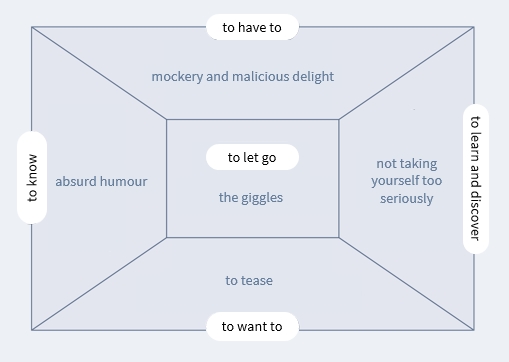Some time ago a manager came to me after a lecture. I had talked about change strategies and he was wondering where humour fits in. We had a pleasant talk about this. And then the cogwheels continued to turn about this.
In this month’s blog I would like to share my progressing insight with you. And this begins with the fact that there is not just one type of humour. There are various types and they all have a different effect.
Absurd humour
The Dutch comedian Herman Finkers is a master at this type of humour:
‘The course dealing with disappointment is cancelled once again’
And this statement from world history (which is still unpleasantly topical) is also a good one:
Journalist to Winston Churchill “How do you feel about British civilisation?”
Churchill: “I find it an excellent idea”
Absurd humour causes a brief ‘short circuit’ in your head. It broadens the mind and makes you see new connections. This (re-)thinking quality is essential in change to be able to find the unusual pathways. So absurd humour can be used perfectly to reinforce action.
Mocking and malicious delight
And there is a type of humour in which we snigger about the behaviour of an absent person. To the listener this can have a guiding effect if we laugh at people who display ‘old behaviour’. Mocking is then a change strategy. However, you may wonder whether it is an ethical change strategy, because you are making fun of someone without his consent only to achieve your own goal.
Teasing
Mocking becomes teasing when the other is there, and you have the intension of perpetuating the relationship with this person. Humour is then a term of endearment. This creates warmth, resulting in the other person being more receptive to your influence. But if you only do it for this purpose, teasing becomes manipulation. Teasing should therefore not only be a change strategy, but an additional effect of a ‘bit of fun’ of which you may reap the benefits.
Not taking yourself too seriously
There is room of laughter in good coach conversations. Putting your own behaviour into perspective in a safe environment give you a release that paves the way for reflection. This why this form of humour is definitely a change strategy.
The giggles
I don’t think you can call the giggles a change strategy. After all, this type cannot be ‘used’, it happens automatically and maintains itself. But it does have a liberating effect and this can only be an advantage.
Humour as an innovating and a liberating force
These five types of humour (there are probably more) can each be given a place in one of my change strategies *. Humour is not a change strategy in itself; every change strategy has its own humour.

We should also not forget that humour can also achieve the opposite; for instance by laughing problems away or by mocking those who are taking a new course. In this case humour is not an innovative but a conservative force.
Finally
You may take offence that I have tried to unravel a phenomenon that in fact loses its beauty when it is unravelled. And you’d be right, but I just can’t resist unravelling. I hope to make up for it with a wonderful quote of a manager who is making a sincere attempt to celebrate a successful change:
‘We stood at the edge of the abyss, but we took a huge leap forward’
I’m Annemarie Mars: speaker, author and advisor on change.
It is my job to get people thinking about the way they give room, direction and guidance to organizations in motion. So that they can look for the essential conversation to change together.
Want to know more about my (online) presentations? Click here.


